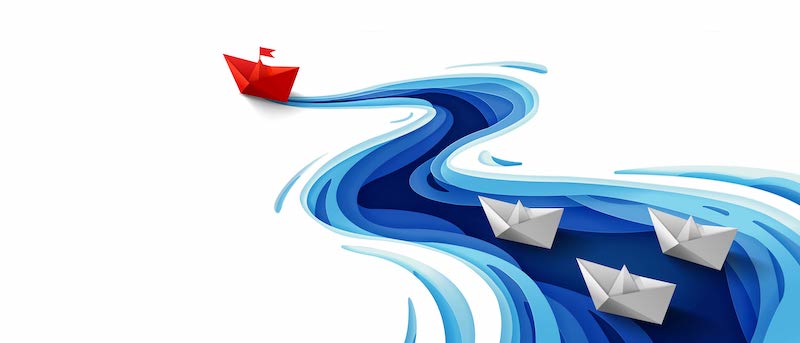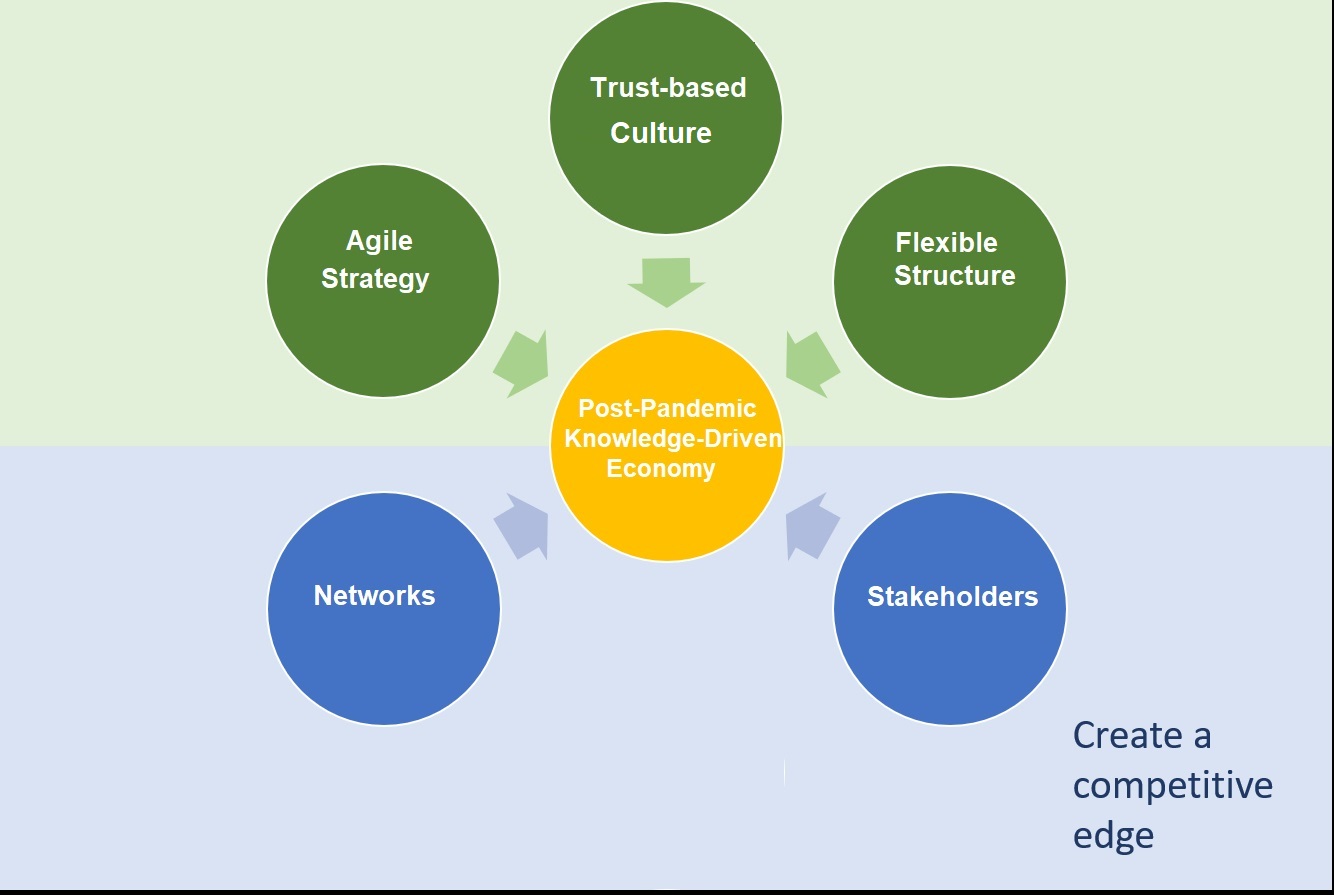Post-pandemic leadership strategies
April 2022: Mostafa Sayyadi offers advice to those in leadership positions in a post-pandemic world in terms of leadership skills, knowledge management and business adaptations

Your future could be in danger if your leaders don't develop their leadership skills
In the post-pandemic crisis, perhaps the most important skill to master is figuring out how to be a genuine source of help as you attempt to manage up. Some things to consider when influencing others are helping people to like you as an individual ready to help, trying reciprocity by helping others, and hoping that they help you when in need.
You can help your manager as you employ the managing-up skills. Perhaps you are dealing with: A new boss, someone you have never met before; a manager you don’t see face-to-face because he or she works in another location; an insecure boss (hint: it’s important to know how to tame his or her ego); an all-knowing or indecisive boss; a manager who gives you conflicting messages; a long-winded boss; a hands-off boss; a manager who isn’t as smart as you; or a boss that is on the board of directors.
Once you have determined how you can influence people by managing up, it is suggested that you come up with a plan to work on them. Use a SWOT analysis such as the one below:
-
Strengths: I am creative and innovative; I communicate well; and I ask the most appropriate questions at the right time and at the right place when I am engaged in a conversation with someone.
-
Weaknesses: I sometimes get ahead of myself and attempt to multitask too much; I respond to people before they finish what they are saying so that I do not forget my point of view; and I often feel that my perspective of a situation is more important than anyone else’s point of view.
-
Opportunities: I see an opportunity to help my colleagues with my creativity and innovation; I attend national conferences each year and I can use this conference to build upon my skills; and I have a great deal of experience and I can succeed in the new ventures that I embark upon.
-
Threats: I feel that I am sometimes at a loss for words; the current economic climate provides me with little opportunity for advancement in my current career; and while I have some education, I feel that without an advanced degree, I am somewhat oppressed.
After conducting a SWOT analysis, you can see how to build on your strengths while taking steps to mitigate your weaknesses. Then, you can go forward with how you can take advantage of your opportunities and avoid your threats post-Covid.
Take some time to assimilate your self-knowledge and develop your ability to engage in leadership. As you identify what you need to move up the corporate ladder, become a government executive, or lead in an academic front; consider the possible obstacles that you may face. Once you have identified your authentic self and which tenets of leadership are important to you, you identify your possible obstacles, and then you are ready to write a goal-affirmation.
Once you have a goal-affirmation, place what you need to do to accomplish this goal or objective on your to-do-List. Remember that you need an action plan to go with your goal. Then, determine the most important things on your to-do-list to help you reach your goals and objectives and, most importantly, you will develop your action plans to accompany your goals.
Knowledge management in the post-Covid era
Executives can look at three-step processes of knowledge accumulation, integration and reconfiguration. This model for managing knowledge reflects a more strategic and practical perspective, as it is process orientated and most applicable in the context of leading organisations. The key point is the knowledge accumulation section, coupled with knowledge integration and reconfiguration to ensure that the knowledge is helping companies exchange knowledge to overcome challenging situations post-Covid.
First, organisational knowledge is accumulated by creating new knowledge from organisational intellectual capital and acquiring knowledge from external environments. In doing this process, executives can particularly develop a workplace which is effective at: Acquiring knowledge about new products/services within our industry; benchmarking performance with competitors or industry; using feedback to improve subsequent practices; utilising teams (eg committees or management teams) to manage knowledge resources; developing and implementing education or training programmes; carrying out a career path or recruitment programme to acquire experts; and conducting organisational events, such as a knowledge contest or knowledge fair, that promote knowledge activities.
Second, knowledge is integrated internally to enhance the effectiveness and efficiencies in various systems and processes, as well as to be more responsive to market changes. In doing this process, executives can particularly develop a workplace which is effective at: Monitoring or controlling organisational knowledge to keep product or services in line with market requirements; regularly assessing knowledge requirements according to environmental changes; linking the knowledge sharing system using various software and programmes; defining core knowledge or core competence areas; using expert groups to evaluate the quality and effectiveness of organisational knowledge; disseminating organisational knowledge among employees; and rewarding individuals or teams based on the quality of knowledge generated.
Third, the knowledge within organisations needs to be reconfigured to meet environmental changes and new challenges, but at the same time should not be leaked to the competition in any shape or form unless agreed upon by senior executives. In this process, knowledge is globally shared with other organisations in the environment. Executives are aware of networking with more successful competitors is a key activity for companies to share successes and communicate best practices as a way of identifying new collaboration opportunities that can occur to meet post-Covid challenges and keep the highest standard of operation in the industry.
In doing so, executives can develop a workplace which is effective at: Creating knowledge alliances with suppliers, customers, or other partners; sharing knowledge management visions and goals with external partners (such as suppliers and customers or other partners) to develop collaborative activities, shared goals and trust-based relationships with them; extending (or linking) knowledge related policies or rules (measurement, rewards) with external partners (such as customers, suppliers or other partners); linking our knowledge sharing system with external partners (such as customers, suppliers or other partners); and facilitating and implementing activities such as conferences, contests, seminars with external partners.
Business adaptations to battle post-pandemic challenges
Executives are under a tremendous amount of pressure in today’s knowledge-driven economy. They began to listen and respond to the plethora of information in the form of articles, books and models attempting to provide effective leadership to help affect not only the productivity and profitability of their organisation, but also its competitive advantage.
Today‘s economy is placing more pressure on companies to achieve a high level of knowledge-driven performance and organisational competitiveness. Knowledge is one such area that plays a critical role and is a strategic prerequisite for business success. Executives who manage knowledge and use it as an important driving force for business success find their organisation to be more competitive and on the cutting edge in the new economic normal. For now, executives can develop conducive organisational climates that foster an atmosphere of trust and openness in which knowledge is a driver of improved performance.
The business environment is constantly changing. Knowledge is a crucial part of hypercompetitive environments. Organisations can design, copy, or update products and services easier with more adaptability now, more than ever. They compete globally, but must think locally if they expect to succeed. And new markets place demands on the roles of change leaders in organisations operating in this modern environment.
Culture, structure, strategy, networks and stakeholders are internal resources that can facilitate knowledge-driven performance and improve the search for knowledge.
Based on an integrated framework of the above ideas and scholarly research, Figure 1 depicts an applicable and reliable model for executives. This framework highlights a relationship between resources and knowledge-driven performance and competitiveness. Organisational resources have sizeable effects on knowledge-driven performance which also leads to better competitive advantage. In fact, better strategy, better culture, better structure, better networks and better stakeholder orientation can all help in this.

Figure 1: The proposed framework
There are vital questions as to how executives can successfully contribute to knowledge-driven performance, subsequently improve competiveness at all levels of the organisation and overcome threats to one's survival as a company. There are practical contributions here, for managers at all levels of the organisation. Knowledge is a strategic resource for organisational portfolios in a post-pandemic world. Many organisations still implement knowledge development initiatives without sufficient consideration of their resources. When executives ensure the effectiveness of resources they also lessen operational risk.
Image: MrArtHit/Adobe Stock